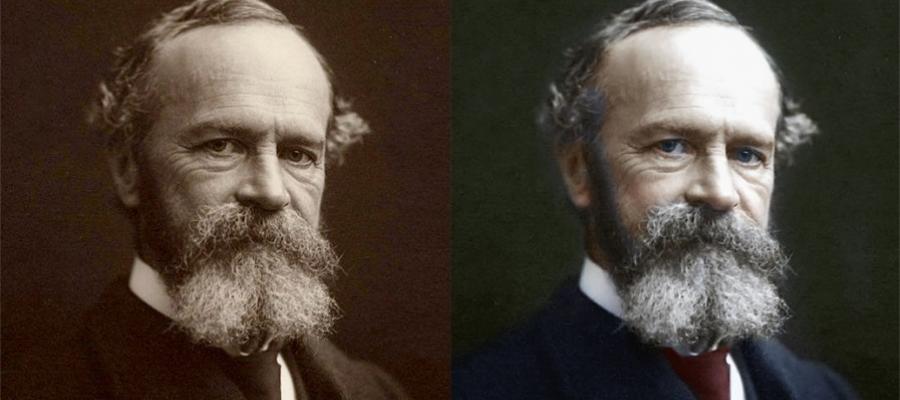William James
Nov 09, 2008William James is a great figure, historically important as a philosopher (pragmatism and radical empiricism), a student of religion (au...

William James, the topic of this morning’s program, is one of America’s greatest philosophers. His career spanned the turn of the Twentieth century; he actually was teaching at Stanford at the time of the 1906 earthquake, and wrote an interesting essay about his experiences and feelings during the quake.
James was a precursor to contemporary philosophers, in that he was really a cognitive scientist / philosopher. He was in both departments at Harvard. His two-volume PRINCIPLES OF PSYCHOLOGY was the bible of psychologists at the time. It still makes fascinating and rewarding reading. His book THE VARIETIES OF RELIGIOUS EXPERIENCE, which is a combination of philosophy, psychology and sociology, virtually originated the serious study of the psychology of religion.
As a philosopher, James is best known for pragmatism. I think there are two sides to pragmatism, one pretty plausible, one not so plausible
The plausible side is his pragmatic theory of meaning. James illustrates it with a story. Some campers are having an argument about this situation. A squirrel is running around a tree in a certain direction. A man is following the squirrel around the tree in the same direction. Both the squirrel and the man are clearly going around the tree. But is the man going around the squirrel? He must be, since he is going around in a circle, inside of which the squirrel lies. But he must not be, because he is always looking at the squirrel's back. If you go around a squirrel you first see his back, then his side, then his front, and so on...
You can see that James hung around with a very intellectual crowd. Apparently, instead of drinking beer and talking about sports, or movies, or even politics, they chose to discuss this rather arcane subject. Anyway, according to James, there was a spirited argument, about whether it was true or not that the man went around the squirrel. But James pointed out that the two hypotheses --- that the man goes around the squirrel and that he does not --- don't lead to different observable consequences.
So he asked his friends: what evidence, what observation, would show that one hypothesis was correct and the other incorrect. And the couldn't come up with anything. So they were really arguing about nothing.The pragmatic theory of meaning points out that both hypotheses have the same observable consequences; or, as one might put it, they both do the same work in predicting the future. So they have the same meaning and the argument is empty.
This is similar to things that Hume said, and what later philosophers, like Carnap, called the verifiability theory of meaning. The meaning of a sentence is basically the observations that would show it's true. William James is a bridge between earlier empiricists like Hume and modern empiricism. Hume looked for meaning of an idea or belief in the causes of an idea, the “sense-impressions” which gave rise to it. 20th century empiricists, following James, look to later sense-impressions, the sense-impressions you will expect to have, if the belief is true.
I don’t think that the pragmatic theory of meaning is going to solve all of our problems, but there is something pretty plausible about it. By my lights the same cannot be said for the pragmatic theory of truth. This is the idea that what makes a belief true is that it works. Here’s a quote:
Truths are goods because we can "ride" on them into the future without being unpleasantly surprised. They "lead us into useful verbal and conceptual quarters as well as directly up to useful sensible termini. They lead to consistency, stability and flowing human intercourse. They lead away from eccentricity and isolation, from foiled and barren thinking"
This seems to me to have things just backwards. If you hold true beliefs you won’t be surprised by experience. But the lack of surprise isn’t what makes the beliefs true. It’s their truth that accounts for the lack of surprise. At any rate, this dubious idea gave James an opening for beliefs like immortality and God; these beliefs may help your life go well …. But that doesn’t, in my humble opinion, make them true.
Our guest will be Russell Goodman from the University of New Mexico, who can take us a little deeper, and perhaps make James theory of truth a little more plausible.
Comments (4)
Guest
Saturday, August 14, 2010 -- 5:00 PM
I would love for you guys to follow James' influenI would love for you guys to follow James' influence with a podcast on Whitehead, the oft overlooked cosmologist.
He was heavily influenced by James'''he embraces experience as the only reality "reality is made up of throbs of experience". He was also a neutral monist.
James influenced another process philosopher, Robert Pirsig, also overlooked by philosophers.
Note, Quine was a student of Whitehead, and Rorty wrote his M.A. thesis on ANW.
If you look for an expert, try to avoid a process theologian, as they co-opted his work.
I think your show might breathe some renewed interest in a brilliant philosopher.
Guest
Monday, August 16, 2010 -- 5:00 PM
For another discussion of "The Varieties of ReligiFor another discussion of "The Varieties of Religious Experience," you can check out the episode on The Partially Examined Life podcast: http://www.partiallyexaminedlife.com/2010/07/18/episode-22-more-jamess-p...
Thanks.
-ML
Guest
Monday, August 23, 2010 -- 5:00 PM
Truth is and nothing more. = MJATruth is and nothing more.
=
MJA
Guest
Saturday, October 16, 2010 -- 5:00 PM
Everyone has their own opinion and what they belieEveryone has their own opinion and what they believe is ethically the right thing for them to do.